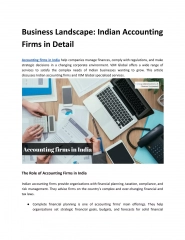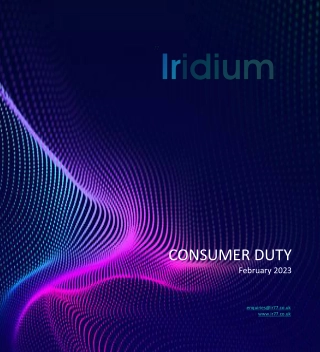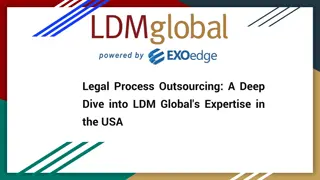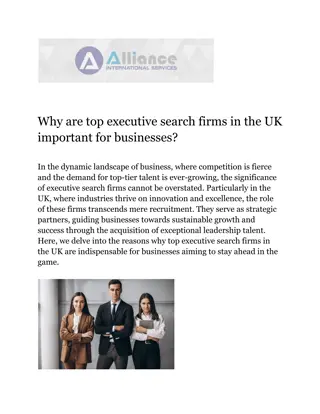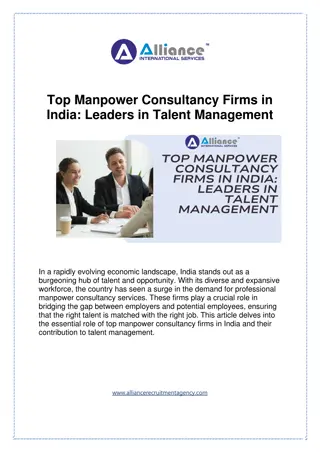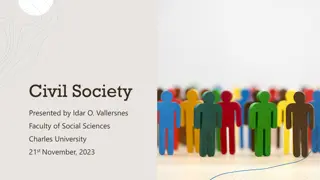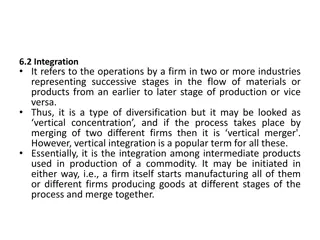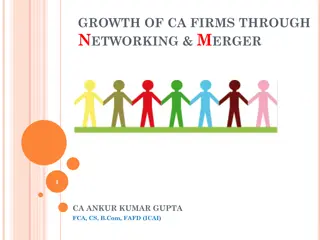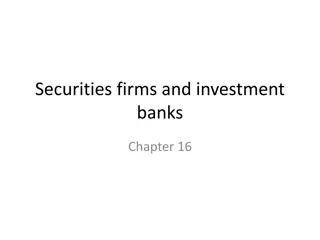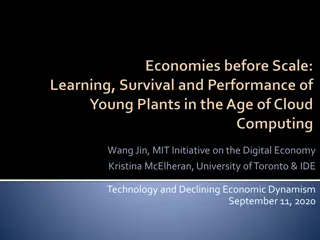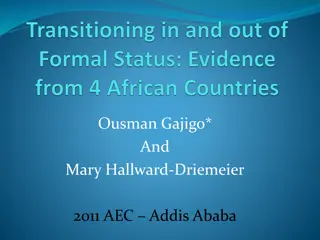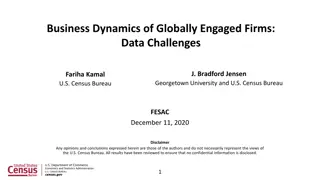
Exploring Firms, Society, and Corporate Social Responsibility
Delve into the perceptions of firms in society, their portrayal in media, and the intricate dynamics of Corporate Social Responsibility (CSR). Discusses societal expectations, managerial reactions, and contrasting normative views on ethical behavior and profit maximization.
Download Presentation

Please find below an Image/Link to download the presentation.
The content on the website is provided AS IS for your information and personal use only. It may not be sold, licensed, or shared on other websites without obtaining consent from the author. If you encounter any issues during the download, it is possible that the publisher has removed the file from their server.
You are allowed to download the files provided on this website for personal or commercial use, subject to the condition that they are used lawfully. All files are the property of their respective owners.
The content on the website is provided AS IS for your information and personal use only. It may not be sold, licensed, or shared on other websites without obtaining consent from the author.
E N D
Presentation Transcript
Firms & Society Views on Corporate Social Responsibility (CSR) B. Arru ada
How are firms perceived? In particular, how are they portrayed in movies and TV?
Firms in films & TV How are different economic agents portrayed? (Objectives, morals, personal relations, etc.?) Employees Bankers Scientists Managers Entrepreneurs How are different firms portrayed? big and small rich and poor strong and weak 10
CSR raises a mix of positive and normative questions Normative 1) What should society demand from firms? Profits but with legal compliance? Ethical behavior? If ethical behavior, who should define it? 2) In any case, how should managers react? Positive 3) How are firms seen by society and stakeholders?
Outline Introduction Opposite normative views US-Liberal view (Arrow, Freeman) Free-Market view (Friedman, Fama) Positive pillars to revise these views Contractual view Cognitive view
Outline Introduction Opposite normative views US-Liberal view (Arrow, Freeman) Free-Market view (Friedman, Fama) Positive pillars to revise these views Contractual view Cognitive view
views (a) The progressive (US liberal ) view: ethical behavior Arrow (b) The free-market view: legally maximize firm value
Arrow 73 justifying CSR Market-failure arguments Monopoly Externalities Information asymmetries Income redistribution Crowding out of altruism Better as an ethical code than as law: more flexible (Arrow, also Fama!)
Do these justifications hold water? Arguably, not Monopoly, externalities, income, etc. These are policy questions: a free society should decide them relying on reason and with proper checks and balances Crowding out of altruism Evidence points out in the opposite direction: greater cooperation observed in societies relying more on market exchange (Henrich et al., 2005 summary, 2001) Are ethical codes superior? More below, but think by now on usury prohibitions
Markets do not crowd out altruism but encourage: Prosocial behaviour Interpersonal trust Universalist moral values Emotions of guilt, shame and anger
Current fashion: CSR ESG + Concepts: sustainable, inclusive Main authors / arguments Hart & Zingales welfare instead of wealth max. Mayer: social preferences of legal persons purpose Piketty labor reps. at corp. boards Events: institutional investors ESG investment funds Regulation Directives on disclosure & due diligence ESG audit & compliance industries indulgences?
views (a) The progressive (US liberal ) view: ethical behavior (b) The free-market view: legally maximize firm value
Free-Market View A. Smith: individual interest collective good See A Map of CSR next Friedman: firms should aim for profits within the law Which checks and balances to define the law? Comparative advantage of politics over CSR? The law of which country? But think: Does it look good to (max.) profits?
A map of CSR (Crook 05) Raises social welfare Reduces social welfare Pernicious CSR (sustainable development, Nike in Malaysia) Raises profits Good management (www.salesforce.com) Reduces profits Borrowed virtue (corporate philanthropy) Delusional CSR (recycling) CSR failures of two types: 1) acting irrationally , so that it does not optimize (delusional); and 2) break bwn individual and social optimum (pernicious)
Outline Introduction Opposite normative views US-Liberal view (Arrow, Freeman) Free-Market view (Friedman, Hart & Zingales) Positive pillars to revise these views Contractual view Cognitive view
Positive pillars to revise the classical views on CSR (a) A contractual pillar
(a) Contractual pillar Firm as nexus of contracts: Fama 21: optimality of residual vs. fixed payoffs contract structure Lacks objectives, etc., like a market But battleground for both internal and external private interests: e.g., modifying the moral code redistributes wealth But seen from outside, a module for contracting, liable, etc. Jensen 02: many objectives, no objective + costly contracting more opportunism (e.g., managerial shirking, sale of indulgences) Reputation as an enforcement device Agency increases risk of business opportunism: Short term incentives reputation damage Also controls compliance re moral code But CSR as risk management (see Franklin 08) To manage conflicts between stakeholder and within stakeholders?
(a+) Contractual pillar (Fama, Eugene F., 2021, Contract Costs, Stakeholder Capitalism, and ESG, European Financial Management, 27, 189-195. Criticisms in red) Contract structures Shareholders bear residual risk Other agents fixed payoffs with easier-to-control risks: Contract writing and renegotiation PLUS law & courts ESG: optimal Governance chosen but there might be externalities (e.g., equal boards)? ESG: Environmental & Social Maximizing shareholders wealth is a result, not an assumption if they care about their portfolio, not about that of its components Not if theirs is a moral criteria: unwilling to trade off across securities Maximizing welfare instead of wealth Operationalizing: firms do not know shareholders ESG exposures moral criteria Aggregating welfare s multiple dimensions (Arrow s impossibility theorem) Contracting for them Externalities better thru ESG activism? Hayekian comparative advantage in specific vs. scientific information bwn moral-driven decentralized markets and politics-driven centrally-produced law
Our two pillars to revise the classical views on CSR (b) A cognitive pillar
(b) Cognitive pillar, based on contractual heuristics If trust matters when contracting , which consequences...: ... if we assert our goal is to maximize profits? practice it? ... show ourselves as a compassionate firm, e.g., a family ? With respect to which communities? Workers, mass clients Is it necessary to use different languages with different partners? Some evidence: see Kahneman, Knetsch & Thaler (1986) Presence of cognitive failure in mass consumer (& even financial?) markets firm as a rationalizing device No tradeoffs within the moral circle Critical consequences for classical views next slides
Against Arrow Moral codes are not necessarily superior: Lending on interest was dammed for centuries, pushing borrowers into loan sharks About, e.g., children s labor: Should we impose our code to poorer countries? What jobs do they get when our firms quit buying? So called fair trade may have similarly bad consequences See case
Against Friedman & Fama Humans in fact apply a moral code to the firm, treating it as an individual Friedman talks of what should be not of what it is Fama s portfolio argument for max. wealth omits that investors do not tradeoff within their moral circle Besides, in any case, should not firms consider humans reaction when deciding? It may even be profitable to believe in CSR (and not only to behave as if it were believed) if true belief is more convincing
Conclusion: CSR as strategy for managing social cognition in a firm seen as nexus of contracts
An old case of public perception: The Spanish savings banks (Cajas) Which had the best reputation banks or savings banks ( cajas )? Which had most mortgages banks or savings banks? Which have received most public aid banks or savings banks? Read, e.g., this (ES) What social work did/do the savings banks? What is the consequence for a bank of announcing big profits? 34
Spains environment for CSR. Remember interventionist Statism Avg., EU countries Spain 1. Who should be responsible for citizens quality of life - State - Each person 2. State should be most responsible for: - Universal health care - Sufficient pensions 7. State should be most responsible for: - Controlling prices - Controlling salaries - Controlling firms profits 8. In favor of (from 0, disagreement; to 10, agreement): - Regulate banks more - Make labor market more flexible 76% 20% 51% 43% 87% 87% 70% 67% 60% 57% 49% 40% 32% 32% 8.5 4.9 7.8 6.2
Social responsibility as (potentially opportunistic) sale of indulgences Rankings. For instance: http://www.csr- survey.org/archive/2003/press.html CSR Consultancy: 1.4 m entries in Google Oxfam s vision CSR area in http://www.ecosfron.org/ Cases The Oxfam-Starbucks case (hidden) New EU Directive on nonfinancial reporting (op-ed) Ryanair boarding passes (next )
Ryanair When charging customers for luggage or for printing their boarding cards, which constituencies is the firm serving? shareholders customers workers Which customers? Those traveling with: little luggage? a lot of luggage?

